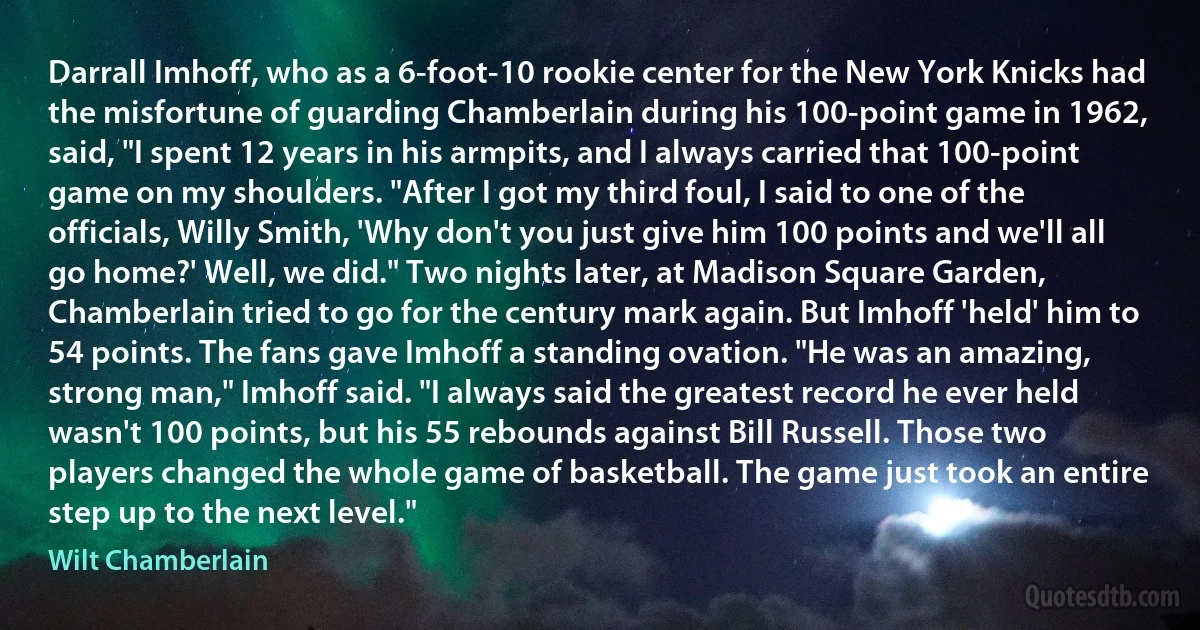
Darrall Imhoff, who as a 6-foot-10 rookie center for the New York Knicks had the misfortune of guarding Chamberlain during his 100-point game in 1962, said, "I spent 12 years in his armpits, and I always carried that 100-point game on my shoulders. "After I got my third foul, I said to one of the officials, Willy Smith, 'Why don't you just give him 100 points and we'll all go home?' Well, we did." Two nights later, at Madison Square Garden, Chamberlain tried to go for the century mark again. But Imhoff 'held' him to 54 points. The fans gave Imhoff a standing ovation. "He was an amazing, strong man," Imhoff said. "I always said the greatest record he ever held wasn't 100 points, but his 55 rebounds against Bill Russell. Those two players changed the whole game of basketball. The game just took an entire step up to the next level."
Wilt ChamberlainRelated topics
carry century chamberlain entire foul game garden hold home later man mark misfortune next ovation say spend square standing step take third try well 100 russell years rookie madison knicks nights pointsRelated quotes
Ron Paul: ...you have to develop the transition, and eventually the next step would be to prohibit the Fed from monetizing debt. This is the real evil. The politicians spend for war, welfare, and they don't have to do it responsibly.
Question: When you say monetize the debt, you mean they would only be able to spend the cash that they had on hand. They couldn't write any cheques for which they don't have in their account any money?
Ron Paul: That's right. And that is the key to it. Because when the Fed comes along, and there's starvation for capital and liquidity, and politicians are spending too much, the Fed can create 20, 30, 50 billion dollars in a day, just like they did trying to bail out this housing bubble crash. So they create money out of thin air endlessly, eventually that has to stop because that drives the value of the dollar down.

Ron Paul
The characteristics of the struggle, in which territory had to be given to the enemy and many years had to pass in order to achieve final victory, with fluctuations, ebb and flow, was that of a protracted war. During the entire struggle one could say that the front lines were where the enemy was. At a given moment, the enemy occupied almost the entire territory and the front was spread to wherever the enemy was. Later the lines of combat were delimited and a main front was established. But the enemy's rear guard constituted another front; it was a total war and the colonialists were never able to mobilize their forces with ease against the liberated zones. The slogan "dynamism, initiative, mobility, and quick decision in new situations" is in synthesis the guerrilla tactic. These few words expressed the tremendously difficult art of popular war.

Che Guevara
It had been the winter of 1835-6 that the ship, Alert, in her voyage for hides on the remote and almost unknown coast of California, floated into the vast solitude of the bay of San Francisco. All around was the stillness of nature. One vessel, a Russian, lay at anchor there, but during our whole stay not a sail came or went. Our trade was with remote missions, which sent hides to us in launches manned by their Indians... Over a region far beyond our sight there was no other human habitations, expect that an enterprising Yankee, years in advance of his time, had put up, on the rising ground above the landing, a shanty of rough boards, where he carried on a very small retail trade between the hide ships and the Indians. On the evening of Saturday, the thirteenth of August, 1859 (I again sailed into) the entrance to San Francisco, (now) the great center of worldwide commerce.

Richard Henry Dana, Jr.
It is my burning desire to help Christians get back to a simple faith in God's Word. Satan's method has always been to instill [sic] doubt in God's Word. The first sentence that came from Satan that is recorded for us in the Bible is: "Yea, hath God said?” He started by questioning God's Word in the garden of Eden. It worked there so he has used it ever since. In the twentieth century the major attack Satan has launched has been against the first eleven chapters of Genesis. He knows that the entire Bible stands or falls on the validity of these chapters. I believe that the Bible is the infallible, inerrant, inspired, perfect Word of God. I believe that the Bible needs to be read and believed as it stands. Christians are often guilty of neglecting or twisting the Bible to fit their lifestyle or their preconceived ideas.

Kent Hovind
I shall present a theory - which I call "the theory of the managerial revolution." During the past century, dozens, perhaps even hundreds, of "theories of history" have been elaborated. All of the theories, with the exception of those few which approximate to the theory of the managerial revolution, boil down to two and only two. The first of these predicts that capitalism will continue for an indefinite, but long, time, if not forever:' that is, that the major institutions of capitalist society, or at least most of them, will not be radically changed. The second predicts that capitalist society will be replaced by socialist society. The theory of the managerial revolution predicts that capitalist society will be replaced by "managerial society," that, in fact, the transition from capitalist society to managerial society is already well under way.

James Burnham
